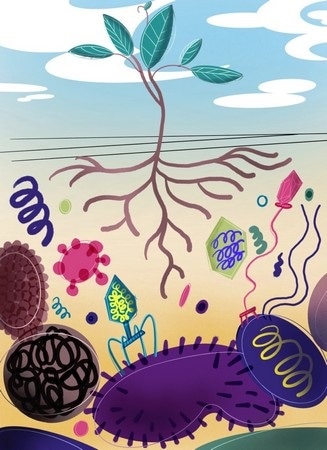Everyone knows the significance of fungi and bacteria for the health of plants. In an individual’s own gut and in marine environments, bacteriophages, viruses that infect bacteria, play an important role in the regulation of microbiome.

An important but neglected component of the rhizosphere communities are viruses (hexagonal structures in the figure) that infect bacteria (rod shape cells in purple and blue. These bacteriophages carry their genetic material (spiral-like structures) inside the capsids (hexagons), which is inserted inside the bacterium through their syringe-like tail. Image Credit: Akbar Adjie Pratama.
Despite this fact, their effect on bacteria thriving around the roots of plants has not been clearly studied.
I cannot believe that they are not important.”
Joana Falcao Salles, Professor, Department of Microbial Community Ecology, University of Groningen
Salles is also the lead author of a review paper published in the Trends in Microbiology journal, which calls for more research into the role played by bacteriophages in plant health.
Bacteria are known to play a significant role in several ecosystems. The prospect of large-scale DNA identification of pathogens has disclosed this over the last 10 years. However, bacteria themselves are impacted by bacteriophages, which are viruses that infect them. These bacteriophages can lyse the bacteria, which, in turn, discharge nutrients into the environment.
However, the bacteriophages can live within the bacterial cells and disrupt their function. Finally, they trigger DNA transfer between cells and are known to have given new functionalities to the cells via this horizontal gene transfer.
Rhizosphere
We know that soil bacteria are important for plants as well. Soils are deserts with very little food, as most nutrients are present in complex forms that microorganisms cannot readily use. However, in the few millimetres of soil around plant roots, plants stimulate the growth of bacteria.”
Joana Falcao Salles, Professor, Department of Microbial Community Ecology, University of Groningen
Salles continued, “Plants release carbon sources for the bacteria and the bacteria provide nutrients and protection for the roots. This creates an oasis called the rhizosphere.”
She wrote a review article along with Akbar Adjie Pratama, a former University of Groningen Ph.D. student (currently working as a postdoc at Ohio State University in the United States) MSc student Jurre Terpstra (whose bachelor thesis motivated the review), and also a visiting scientist Andre Luiz Martinez de Oliveria from Universidade Estadual de Londrina based in Brazil.
In the review article, Salles explained the function of bacterial viruses in altering the microbial community in the gut and in seawater.
‘If viruses are important in these systems, why would they not be important in the rhizosphere?’ she asks. Nevertheless, this was the conclusion of a paper published not too long ago. ‘The scientists had counted viral particles in the soil and found very few of them. However, bacteriophages can even have effects when they are living inside cells’.”
Joana Falcao Salles, Professor, Department of Microbial Community Ecology, University of Groningen
Overlooked
Technical issues may also have affected research into soil viruses.
Salles added, “We have the technology to identify viruses in ocean water and in our gut. Finding them in the soil is quite a challenge.”
While it is relatively easier to screen the virus particles from water, isolating them from a slurry is much more complex. Salles believes that this could be the reason for overlooking the bacteriophages.
She stated, “There are just a handful of institutes where soil phages are being studied.”
Salles’ own institute, the Groningen Institute for Evolutionary Life Sciences, has now appointed a virologist. Along with her team, she will begin to look out for evidence relating to the significance of bacteriophages.
Salles added, “For instance, certain phages could stimulate microbes that will protect plants during droughts.”
In yet another project, Salles is planning to examine the impact of viruses on the potato microbiome by using a large number of various species of potatoes.
Forgotten sibling
“Microbes were once considered to be unimportant until microbiome technologies showed otherwise. Sequencing viruses has become much easier now and I cannot imagine that they are not important. Bacteriophages are the forgotten sibling and, in my opinion, we underestimate their importance,” Salles concluded.
Source:
Journal reference:
Pratama, A. A., et al. (2020) The Role of Rhizosphere Bacteriophages in Plant Health. Trends in Microbiology. doi.org/10.1016/j.tim.2020.04.005.